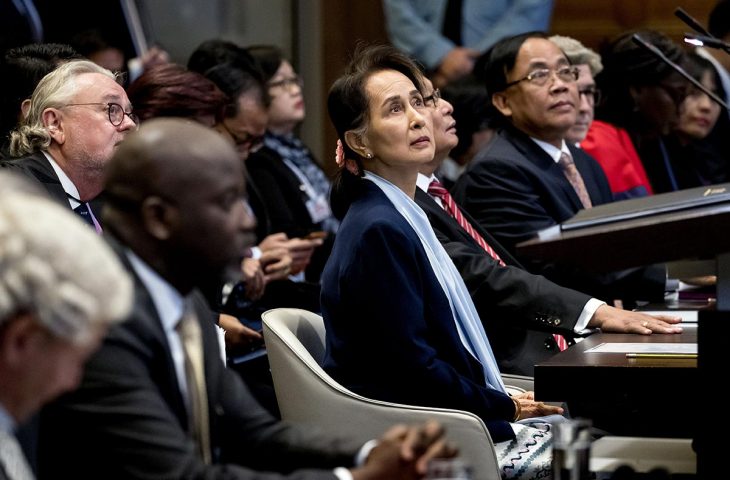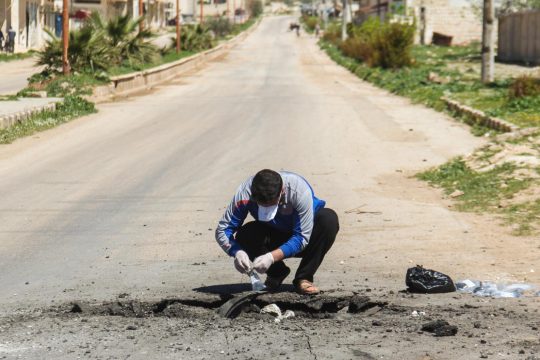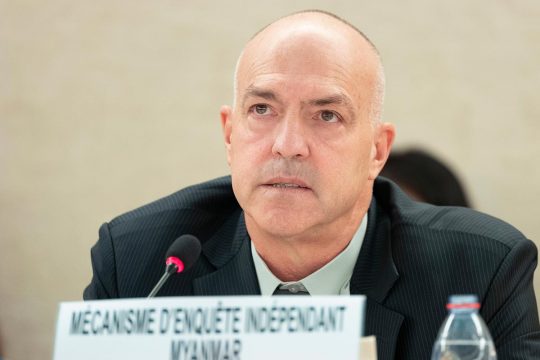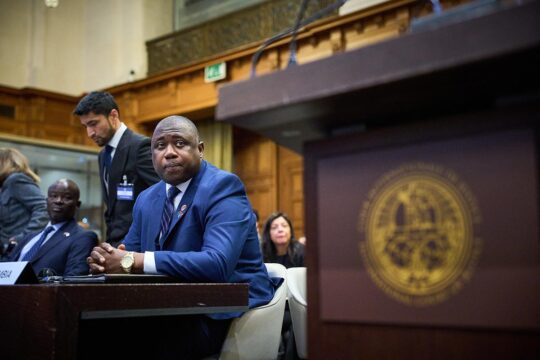In the absence of justice, the Independent Investigative Mechanism for Myanmar (IIMM or Myanmar Mechanism) was set up to gather and preserve evidence for possible international or national trials in the future. In the meantime, The Gambia, a small West African state itself emerging from dictatorship and human rights abuses, has taken a historic step in bringing a case before the International Court of Justice (ICJ) against Myanmar for violation of the 1948 Genocide Convention. That court ordered Myanmar to take "all measures" within its power to stop the grave violence against the Rohingya community, which Human Rights Watch says it has not done. The case involving the two States (but not individuals) is ongoing.
Waiting for Naypyidaw’s responses
Recently in Geneva Kaoru Okuizumi, deputy head of the Myanmar Mechanism, told Justice Info that it has “shared information” with the two parties to this case at their request. This could be a first step, she says, to more collaboration with Naypyidaw, Myanmar’s capital: “In terms of our request to visit Myanmar and our requests for information, we’re still waiting for responses from the government. We have not been successful so far. But we do have that line of communication with Myanmar with respect to the ICJ proceedings. It is, we hope, a first step towards a broader engagement, a cooperative relationship.” The International Criminal Court (ICC), whose mandate is to prosecute individuals on grounds of their alleged responsibility for international crimes, has also opened a case on crimes perpetrated against the Rohingya population. Okuizumi says the Mechanism has also been “engaging with the ICC”. She did not give details.
Focus on sexual violence
In 2017, militants from Myanmar’s Muslim Rohingya ethnic group attacked police posts, prompting a huge army crackdown that pushed nearly a million Rohingya into exile in neighbouring Bangladesh. UN reports say the army, sometimes helped by local Buddhist militias, torched villages, committed mass killings, rape and sexual violence. A UN report said the country’s army chief and five other top military officials should be prosecuted for “genocide, crimes against humanity and war crimes”.
The Mechanism’s latest annual report to the ongoing UN Human Rights Council session in Geneva has been generally welcomed by NGOs. But they urged it to pay particular attention to sexual violence. “We know from all the reports and information we have that sexual violence was very much part of the conflict and continues to be part of the situation on the ground in Myanmar,” responds Okuizumi, a Japanese lawyer and sexual violence expert. “So, it’s an area that we’re focussing very much on. Our intention is to make sure that sexual and gender-based violence is infused into all aspects of our work and that it’s not just the work of specialists but really a core part of our investigative strategy.”
First year of operations
In its report, the Mechanism says that “in its first year of operations, the Mechanism has been focused on ramping up its operations and activities on various fronts, including its operational and administrative processes, its engagement with relevant entities and stakeholders, and the implementation of its substantive mandate.”
The Covid-19 pandemic has, however, put a significant spanner in the works. The Mechanism’s team have not been able to travel to the region since last December and new staff have had to start working online. Given also the slowness of the UN recruitment process, says Okuizumi, the new evidence-gathering body has just over half of its staff in place. Full capacity would be about 60 people, she says.
The Mechanism is based in Geneva, Switzerland, far from the scene of the alleged crimes it is investigating, notably against Myanmar’s Rohingya Muslim ethnic minority. “We would love to have a small team based in the region,” Okuizumi told Justice Info. “That’s one of the reasons we went to Asia in December to meet with governments to see if it might be possible to have a presence in the region. Unfortunately, there hasn’t been as much interest as we had hoped at this time.” Discussions are still under way, she indicates.
“And yes, it’s far more expensive to travel. We lose time,” she continues. “At the same time, we don’t underestimate what we can do from a distance because there are tremendous amounts of material, information, resources through the Internet, through open sources. We can also communicate with various partners and interlocutors through virtual means. It has not necessarily impeded us in terms of our ability to collect information, especially as we are still at the very early stages in our lifespan.”
Too slow?
Yet, justice is far from there. “I understand that victims think the Mechanism is working too slowly,” admits Okuizumi. “But international criminal justice is not a quick process. We’re investigating very complex cases, involving very complex situations, complex hierarchies, and complex organisational structures. I don’t think that anyone should have the expectation that we’ll have full-blown cases anytime soon.”
The Mechanism wants to take time to do things “properly”, she said. “It takes time to identify the appropriate persons to interview and also ensure that they have the appropriate support in terms of their psycho-social and medical needs as well as their immediate and long-term security needs,” she continues. “That includes protecting their identities and protecting the information that they provide.”
Indiscriminate shelling and airstrikes
Okuizumi stresses that the Mechanism is not only looking at crimes against the Rohingya: “We are looking at all serious crimes and violations committed in Myanmar since 2011, and through our very existence we hope that we can also serve as a deterrent to those violations taking place,” she told Justice Info.
In a separate submission to the Human Rights Council last week, UN Special Rapporteur on Myanmar Thomas Andrews of the US expressed concern about ongoing violence against civilians in Myanmar, including children, as well as new military installations on former Rohingya villages in Rakhine State. “Where is justice for those stranded in refugee camps in Bangladesh while facilities are constructed on their homeland for the same military that stands accused at the International Court of Justice for committing genocide against them?" he asked. Following his statement, Amnesty International adds: “In Rakhine and Chin States, where fighting between the Myanmar military and [insurgent] Arakan Army has been escalating since early 2019, we have been alarmed by ongoing reports of civilians — including children — injured and killed through indiscriminate shelling and airstrikes by the Myanmar military. Tens of thousands have been displaced.”
Forum Asia, which has member NGOs across Asia including Myanmar, warns that “atrocities of the Myanmar military will continue unless the international community takes urgent steps to hold perpetrators of genocide, war crimes and crimes against humanity against Rohingya and other ethnic minorities to account”. “We reiterate our calls to the UN Security Council to refer Myanmar to the ICC or establish an ad hoc tribunal,” it continued.
A shrinking budget
The Mechanism continues to enjoy the support of NGOs. Forum Asia, for example, commended its “efforts to strengthen public outreach and engagement with all relevant stakeholders” and said the “the international community should ensure long term sustainability of the Mechanism by ensuring adequate resources for it to continue its mandate”. The Mechanism has an annual budget of some $14 million which comes from the UN regular budget, but faces a funding gap as many member States have not contributed. It has had to slim down its 2021 budget and is appealing for bilateral donations. In that respect and for its evidence-gathering work, obtaining effective collaboration with the government of Myanmar could be key.









